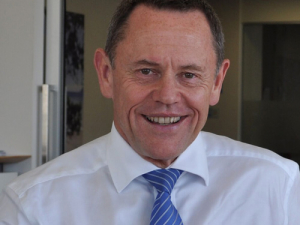Simon Upton urges cross-party consensus on New Zealand environmental goals
Parliamentary Commissioner for the Environment Simon Upton is calling for cross-party consensus on the country's overarching environmental goals.
 Simon Upton says the argument that NZ is not causing any more global warming than it currently does won’t cut it with the rest of the world.
Simon Upton says the argument that NZ is not causing any more global warming than it currently does won’t cut it with the rest of the world.
A warning for people who say all NZ has to do is argue that it is not causing any more global warming than it currently does: That argument won’t cut it with the rest of the world, according to the Parliamentary Commissioner for the Environment, Simon Upton.
Speaking at the recent Agricultural Climate Change conference in Wellington, Upton told the 300 delegates that under the Paris Agreement, NZ has an international obligation to do as much as it can to keep the 1.5 °C global goal within reach. He says it’s not a credible negotiating position to say that our largest contribution to warming is off limits when we have the option to reduce it.
“Neither should we be tempted by the argument that since we’re a little country it doesn’t make sense for us to develop the technologies needed to solve the world’s problems and that we should instead be a fast follower,” he added. “We have more skin in this game than others and we have serious research capacity.”
Upton says NZ has long congratulated itself on its productivity and resourcefulness, and logic leads to the conclusion that we have to tackle this problem head on. He says there is pure self interest in this because NZ has an interest in continuing to sell products to high income markets where consumers are taking an increasing interest in the emissions footprint of their food and drink.
“Being able to show that New Zealand products are associated with the lowest possible emissions will be essential if we are to continue to be a preferred supplier.”
Upton agrees with the Climate Change Commission and the Government that having targets to reduce warming from methane to below the current level is justified.
However, he believes that the current target of a 24–47% reduction by 2050 is so wide a range that the scale of transformation expected from the primary sector is very unclear. If the 2050 methane target is updated, he would encourage the Government to choose a narrower target range.
Upton says to meet any emissions target, there’s a need to build a solid consensus about how this is best progressed.
He says reductions in emissions from livestock can be achieved through a combination of two strategies: The first is reducing livestock numbers through lower stocking rates per hectare and land use change. The other option is reducing emissions per animal, through changes in management practices and the uptake of new on-farm mitigation technologies as they become available.
According to Upton, even in the absence of a price on biological emissions, we are seeing land use change driven by an insatiable demand for carbon offsets as the NZ ETS price rises.
“As many of you know, I have expressed grave doubts about our reliance on forestry offsets as a way of meeting emissions targets for fossil carbon dioxide. We should wean ourselves off this option.”
Option>
In terms of reducing emissions per animal, Upton says in the dairy sector, changing management practices can deliver moderate reductions.
He claims promising new mitigation technologies are in the pipeline, including methane and nitrification inhibitors, breeding low-emission sheep and cattle, lowemission feeds and feed additives – as well as the Holy Grail, a methane vaccine.
Upton adds that while each of these mitigation technologies are all at different stages of development, each has its own particular set of challenges and barriers to overcome before it can be widely implemented in a NZ context.
“But it is clear that without accelerated progress on some of these technical fixes, the only way we will meet our 2050 methane target will be through very large reductions in stocking rates.”
The World Wide Sires National All Day Breeds Best Youth Camp Best All Rounder plaudit has become family affair, with 2026 Paramount Cup winner Holly Williams following in her sister Zara's footsteps.
DairyNZ is giving New Zealand farmers a unique opportunity to gain hands-on governance and leadership experience within the dairy sector.
Herd improvement company LIC has posted a 5.2% lift in half-year revenue, thanks to increasing demand for genetics.
According to the latest Fresh Produce Trend Report from United Fresh, 2026 will be a year where fruit and vegetables are shaped by cost pressures, rapid digital adoption, and a renewed focus on wellbeing at home.
The Roar is a highlight of the game hunting calendar in New Zealand, with thousands of hunters set to head for the hills to hunt male stags during March and April.
OPINION: The past few weeks have been tough on farms across the North Island: floods and storms have caused damage and disruption to families and businesses.